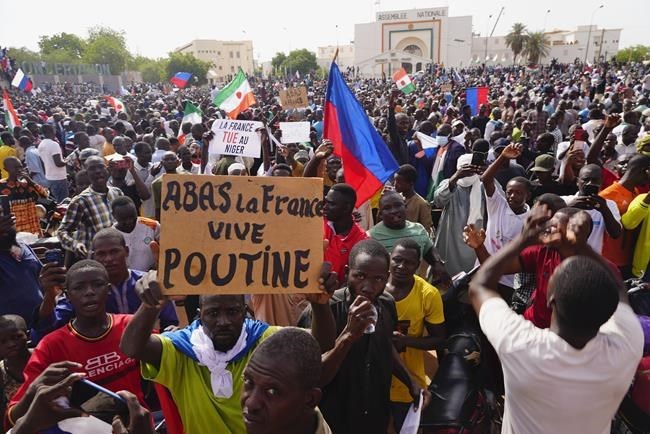OTTAWA — Canada is speaking out against a coup d'état in Niger, but hasn't joined other nations in threatening to sanction or cut aid to the West African country.
Last Wednesday, a faction of Niger's military claimed to have overthrown the country's democratically elected president Mohamed Bazoum after detaining him in his palace.
In a tweet Friday evening, Global Affairs Canada wrote that Ottawa "strongly condemns the attempted coup" in Niger and calls for Bazoum's release.
Foreign Affairs Minister Mélanie Joly added to that message Monday.
"Canada calls on the release of President Bazoum and his reinstatement as head of state of Niger," she tweeted. "The democratically elected government must be reinstated immediately."
Ottawa is throwing its support behind the Economic Community of West African States, a group of 15 countries known as ECOWAS.
That bloc has threatened to sanction leaders of the military junta and send in troops if Bazoum isn't restored to power within a week.
Britain and the European Union have pulled aid from the country, while Washington has mulled following suit. The Liberal government in Ottawa has given no indication it is thinking of cutting back on development and humanitarian dollars for Niger, which has amounted to roughly $60 million per year.
"Niger is an important country for Canada and for the rest of the world," said Rita Abrahamsen, a University of Ottawa professor specializing in African politics and security.
The tumult in Niger is the latest in a series of attempted coups across the Sahel region, where the so-called Islamic State group has been recruiting militants and committing massacres. The political instability comes as the Russian mercenary group Wagner meddles in countries across the region.
Prime Minister Justin Trudeau last met with Bazoum in November at a summit in Tunisia, where he praised his "leadership in progressive values" such as women's inclusion and democracy in a region of rising authoritarianism.
At the time, Bazoum noted Canada had been less present in his country since the 1970s when Ottawa as the forefront of development programs.
"We have a little distancing and we're going to work on that (to) make sure that our ties make us even closer," Bazoum said in French on Nov. 20, 2022. "We will be committed to making our relationship stronger."
Abrahamsen said Niger is important because it has one of the youngest populations in the world and has been a democratic partner for western countries. Niger has uranium reserves for which there is increasing global demand, as well as a sizable presence of mines run by Canadian corporations.
Four nations are run by military governments in West and Central Africa, where there have been nine successful or attempted coups since 2020.
Of Niger, Abrahamsen said: "This is sort of the last bastion of democracy, the last hope in the Sahel belt."
She noted that across Africa, western countries have been channelling military aid in the hopes of preventing terror groups from causing chaos both on the continent and abroad. But she said a lack of commensurate support for strengthening civilian society might have contributed to the current crises.
"All the external assistance and all the domestic efforts to fight the jihadists have not been very successful," Abrahamsen said. "So people are unhappy, and the military in various countries are looking for somebody to blame. So they blame the people in charge."
On Sunday, ECOWAS said that all its member countries will suspend commercial and financial transactions with Niger and freeze assets in regional central banks.
The economic sanctions could have a deep effect on Nigeriens, who live in the third-poorest country in the world, according to the latest United Nations data. The country relies on imports from Nigeria for up to 90 per cent of its power, according to the International Renewable Energy Agency.
The sanctions could be disastrous and Niger needs to find a solution to avoid them, the country's Prime Minister Ouhoumoudou Mahamadou told French media outlet Radio France Internationale on Sunday.
"When people say there's an embargo, land borders are closed, air borders are closed, it's extremely difficult for people … Niger is a country that relies heavily on the international community," he said in French.
The 15-nation ECOWAS bloc has unsuccessfully tried to restore democracies in nations where the military took power in recent years.
In the 1990s, ECOWAS intervened in Liberia during its civil war. In 2017, it intervened in Gambia to prevent the new president's predecessor, Yahya Jammeh, from disrupting the handover of power. Around 7,000 troops from Ghana, Nigeria, and Senegal entered, according to the Global Observatory, which provides analysis on peace and security issues.
If the regional bloc uses force, it could trigger violence not only between Niger and ECOWAS forces but also civilians supporting the coup and those against it, Niger analysts say.
"While this remains to be a threat and unlikely action, the consequences on civilians of such an approach if putschists chose confrontation would be catastrophic," said Rida Lyammouri, senior fellow at the Policy Center for the New South, a Morocco-based think tank.
Lyammouri also said he does not see a "military intervention happening because of the violence that could trigger."
U.S. Secretary of State Antony Blinken commended ECOWAS's leadership Sunday to "defend constitutional order in Niger" after the sanctions announcement, and joined the bloc in calling for the immediate release of Bazoum and his family.
Meanwhile, Russia has praised the coup in Niger, seizing on anti-western sentiment in the country that predated the military takeover.
Abrahamsen said Canada seems to be taking the right tack in supporting African groups in their response to the crisis, such as leveraging sanctions.
"It is important to signal to potential other coup-makers that life will not continue uninterrupted if you overthrow democratically elected governments, so there ought to be some sanctions," she said.
"Otherwise, coups might well be contagious."
This report by The Canadian Press was first published July 31, 2023.
— With files from The Associated Press
Dylan Robertson, The Canadian Press
